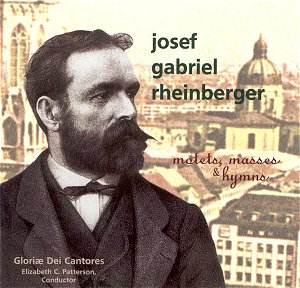Having
just reviewed this group’s later CD of Bach (recorded five
years after this one and the result not so consistently good),
I am more than ever impressed by the strength and quality of the
tenors and basses in this choir. There’s a creamy tone and sublime
line to the tenors, while the basses take on an almost Russian
quality of tone in places. The work in which to hear them at their
best is obviously the Mass in F for male voices and organ, and
for this performance alone I would recommend this disc.
Rheinberger is probably known for his writing
for organ. His first appointment was at the age of seven at the
Vaduz Chapel of St Florian, with its largely Catholic German congregation.
His first Mass appeared only a year later, and in a performance
the precocious child admonished the officiating bishop for singing
out of tune. He spent his life in Munich, became an esteemed professor
of composition at the Conservatoire, conductor of the city’s choral
society, and organist at St Michael’s Church. He had two operas
performed there and held the influential post of conductor of
the Royal Chapel from 1877 to 1895. He flirted with Wagner, having
been caught up in the preparation of Tristan in 1865 under
von Bülow (who thought very highly of him). He was no doubt
further disenchanted by the experience of being patronised by
the mad King Ludwig of Bavaria, not having Wagner’s sleight of
hand in turning such a situation to his own advantage. When it
came to making a decision, Rheinberger threw in his lot with the
Brahms camp and took a more conservative path. However he also
explored the distant past of Orlando di Lasso and the Venetian
School.
Such a love for the past is clearly manifest
in the contrapuntal character of his choral writing. He wrote
eighteen masses of which four come from his student years. Only
two are accompanied by orchestra. One, like Bruckner’s in E minor,
is for male voices and wind instruments only. The one for female
voices, subtitled sincere in memoriam takes its cue from
Brahms’ writing for female voices, harp and two horns and is dedicated
to the memory of the master who had just died. It is a strikingly
beautiful work, colourful and rich-textured despite its limited
vocal range. Its strengths are particularly apparent at the end
of the Gloria and the Crucifixus in the Creed. The ladies
of Gloriae Dei Cantores perform it effortlessly and with expressive
colour. The disc ends with an idiomatic account of the a cappella
Mass Op.109. This is another fine work with some sublime moments.
It is scored for two choirs, was dedicated to Pope Leo XIII and
earned Rheinberger admission to the Order of St Gregory.
This is an illuminating and revelatory disc which
reflects great credit on this forty-strong choir, its organist
David Chalmers, and upon the conductor Elizabeth Patterson.
Christopher Fifield
